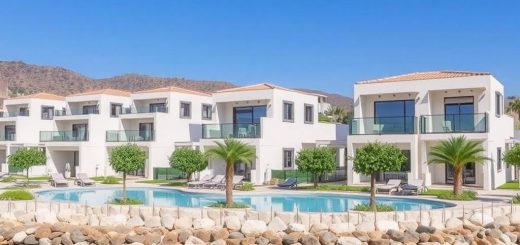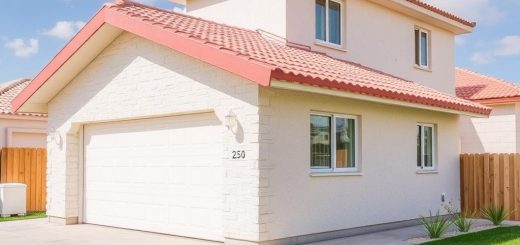Landscaping Your Cyprus Property: Mediterranean Garden Ideas
Landscaping your Cyprus property offers a unique opportunity to blend nature’s Mediterranean charm with innovative garden design that suits both the climate and lifestyle of this remarkable island. With its distinctive weather patterns, soil types, and cultural heritage, Cyprus demands a tailored approach to garden creation and maintenance. The Mediterranean garden style encapsulates warmth, vibrancy, and practical elegance, making it an ideal choice for property landscaping Cyprus.
From the initial blueprint of landscape design Cyprus to the ongoing demands of garden maintenance Cyprus and outdoor property care Cyprus, crafting and sustaining a thriving garden here requires deliberate choices and well-honed strategies. This guide goes beyond just aesthetics, diving into soil science, plant selection, irrigation methods, and the integration of traditional and modern landscaping methods suitable for Cypress’s environment. Whether you own a sprawling villa or a modest home, creating property gardens Cyprus that flourish can deeply enhance your living environment, increase property value, and foster a connection to the island’s natural rhythms.
Understanding Cyprus’ Climate and Its Impact on Garden Design
One of the most critical factors influencing landscaping decisions in Cyprus is the island’s Mediterranean climate, characterized by hot, dry summers and mild, wet winters. This climate offers both opportunities and challenges for property owners. Successful garden maintenance Cyprus hinges on a clear grasp of how seasonal conditions affect plant choices, soil moisture, and pest management.
Summer temperatures regularly soar above 30°C, often accompanied by prolonged drought periods. These conditions necessitate plant selections that are drought-tolerant and soil management strategies that conserve moisture. Conversely, winter months bring enough rainfall to nourish the gardens but also require drainage solutions to prevent waterlogging. Additionally, the sunny weather calls for creating shaded retreats within garden spaces to balance comfort and visual appeal.
Designing with Cyprus’ climate in mind ensures longevity and vibrancy for your Mediterranean garden all year round.
The underlying soil compositions in various parts of Cyprus range from calcareous and rocky to more fertile valley soils. Understanding the soil type on your property is fundamental for effective landscape design Cyprus as it influences water retention, nutrient availability, and plant health. Soil testing before finalizing your landscaping plan will inform amendments and the selection of plants adapted to these conditions.
Plant Selection: Native and Mediterranean Species for Sustainable Gardens
Choosing appropriate plants is at the heart of successful property landscaping Cyprus. Mediterranean gardens thrive on species that have evolved to withstand dry summers, tolerate poor soils, and bloom with minimal intervention. Utilizing native and Mediterranean species reduces irrigation needs, supports local biodiversity, and promotes resilience against pests and diseases endemic to the region.
Common selections for property gardens Cyprus include olive trees, rosemary, lavender, oleander, and fig trees. These plants not only embody the character of Cyprus but also add texture, color, and fragrance to any landscape. Some evergreen shrubs provide year-round structure, while seasonal flowering plants bring periodic bursts of vibrant hues.
Deciduous trees like carob and pomegranate offer shade during summer while allowing sunlight through in winter, balancing temperature regulation naturally. For ground cover and borders, drought-resistant herbs such as thyme and santolina are ideal, enhancing both soil stability and garden aroma.
Leveraging native and Mediterranean flora reduces resource consumption while maintaining a garden that looks authentic and thrives in Cyprus’ climate.
| Plant Type | Common Species | Benefits |
|---|---|---|
| Trees | Olive, Fig, Carob, Pomegranate | Shade, fruit production, drought tolerance |
| Shrubs | Oleander, Rosemary, Lavender | Evergreen structure, fragrance, low water needs |
| Ground Cover | Thyme, Santolina, Creeping rosemary | Soil retention, aromatic, drought resistant |
| Climbers | Bougainvillea, Jasmine, Wisteria | Colorful floral displays, shade, vertical interest |
Irrigation Strategies for Efficient Outdoor Property Care Cyprus
Irrigation is a pivotal component in the sustainability of outdoor property care Cyprus, largely because the long dry season stresses plants and depletes soil moisture. Gardeners and designers must choose irrigation methods mindful of water conservation laws, seasonal fluctuations, and the diverse water needs of different plant species.
Drip irrigation systems are often the preferred choice due to their precision in delivering water directly to the plant’s root zone. This method minimizes evaporation and runoff, conserving water while ensuring deep soil moisture. Where drip irrigation is unfeasible, soaker hoses and micro-sprayers can be alternatives but generally require more attention and adjustment.
Incorporating water harvesting techniques also supports irrigation efficiency. Many property landscaping Cyprus designs include rainwater collection systems such as barrels or cisterns integrated into the landscape, which supplement irrigation in drier periods. Mulching is additionally essential, as it reduces surface evaporation and warms the soil during cooler months.
Smart irrigation keeps your Mediterranean garden lush and healthy without wasting precious water resources.
Hardscaping Elements to Complement Cyprus Gardens
Hardscaping—stonework, paving, walls, and patios—plays a crucial role in the landscape design Cyprus, particularly in Mediterranean gardens. The right materials can accentuate the garden’s natural beauty while providing functional spaces for outdoor living, entertaining, and connection with nature.
Local stone, such as limestone or sandstone, is favored for its durability and natural appearance that harmonizes with plantings. Terracotta tiles, cobblestone, and gravel pathways are not just practical but contribute to the traditional aesthetic that many property owners seek.
Water features, such as small fountains or reflecting pools, add a sensual element of movement and sound, enhancing the environment’s tranquility. These also serve as focal points amongst lush foliage and can attract birds and pollinators, increasing garden vitality.
Seating areas shaded with pergolas draped in flowering climbers like wisteria or bougainvillea create inviting spaces that encourage relaxation and social interaction. Consider low garden walls or steps to manage slopes common in Cyprus properties and assist with soil retention.
Design Principles of Mediterranean Gardens in Cyprus
Mediterranean gardens in Cyprus are not random assemblages of plants and features but follow design principles that reinforce harmony, sustainability, and usability. The overall landscape design Cyprus seeks balance between open spaces and structured planting, combining hardscape with softscape in seamless transitions.
Symmetry and repetition are common design elements, where groups of similar plants or paired features create rhythm and order. Contrasting textures—such as the ruggedness of stone next to the softness of lavender—or the interplay of light and shadow offer visual interest throughout seasons.
The Mediterranean garden often includes distinct “rooms” or zones—outdoor dining spaces, quiet reflection areas, and herb gardens—each serving a specific purpose while maintaining cohesion across the property. Pathways guide movement and reveal new views, enhancing the sensory experience.
Effective landscape design Cyprus blends aesthetics with function, making every inch of your garden purposeful and beautiful.
Garden Maintenance Cyprus: Practices for Longevity and Beauty
Maintaining property gardens Cyprus requires a routine that adapts to seasonal shifts while anticipating long-term garden health. Proper pruning is essential for Mediterranean plants, encouraging growth, removing dead material, and shaping plants to fit their roles, whether for shade or visual appeal.
Monitoring soil health through periodic testing helps ensure nutrient levels are adequate, and organic compost or amendments can be applied to improve fertility where necessary. Pest management in Cyprus gardens tends towards integrated methods, balancing biological controls with limited chemical usage to protect the environment.
The summer months call for vigilant irrigation checks, mulch replacement, and sun protection for vulnerable plants. In winter, clearing gutters, checking drainage systems, and removing fallen leaves help prevent disease and structural issues.
Regular property landscaping Cyprus professionals often recommend scheduled cleaning and layering seasonal plants to maintain interest and freshness within the garden space year-round.
Enhancing Wildlife and Biodiversity in Cyprus Gardens
Encouraging wildlife in Mediterranean gardens supports ecological balance and reduces the likelihood of pest outbreaks. The adoption of native plants creates habitats for local insects, birds, and small mammals.
Incorporating bird feeders, water baths, and insect hotels contributes to a lively garden ecosystem. These elements can also enhance homeowners’ outdoor experience by attracting visible, audible signs of nature thriving within cultivated spaces.
Using chemical-free gardening practices underpins these efforts, reducing harm to beneficial organisms and supporting pollination.
Technology and Modern Trends in Landscape Design Cyprus
Modern landscaping integrates technology to optimize outdoor property care Cyprus, especially in areas such as irrigation management, lighting, and security. Smart irrigation controllers that adjust watering based on soil moisture and weather forecasts minimize waste while preserving plant health.
LED garden lighting controlled via apps allows for customizable ambiance that extends the usability of outdoor spaces into the evening. Motion sensors and cameras integrated unobtrusively into the landscape improve security without detracting from aesthetics.
Additionally, sustainable design trends emphasize the use of recycled materials, solar-powered systems, and eco-friendly construction techniques to reduce a property’s carbon footprint.
Your Mediterranean Garden Awaits: Turning Vision Into Reality
Embarking on property landscaping Cyprus is a journey that combines vision, knowledge, and practical execution. The Mediterranean garden style leverages the island’s natural assets to craft an outdoor space that is both sustainable and beautiful—inviting you to savor Cyprus’ climate and lifestyle in your own backyard.
Engage with local landscape architects to tailor designs that reflect your needs and preferences, respecting the ecological context. Invest time in understanding plant species, irrigation approaches, and maintenance demands to ensure your garden flourishes long-term. Your property gardens Cyprus can become an extension of your home’s character and a sanctuary that balances nature and human artistry.
With informed design and care, your Cyprus garden becomes a timeless Mediterranean retreat full of life, color, and tranquility.
FAQs on Landscaping Your Cyprus Property
- What are the best drought-tolerant plants for Cyprus gardens?
Olive trees, rosemary, lavender, oleander, and carob are among the best drought-tolerant species suited for Cyprus’s climate. - How often should I water my Mediterranean garden in Cyprus?
Irrigation frequency depends on the season, but generally, deep watering every 7–10 days during summer suffices, with much less needed in winter. - Can I use rainwater harvesting for garden irrigation in Cyprus?
Yes, rainwater harvesting is highly effective and encouraged as a sustainable method to support garden irrigation and reduce reliance on municipal water. - Is professional garden maintenance necessary for Cyprus properties?
While some maintenance tasks can be DIY, hiring professionals ensures healthy growth, proper pruning, and pest control suited to local conditions. - How do I prevent soil erosion on sloped Cyprus properties?
Installing retaining walls, terraces, and using ground covers with strong root systems helps prevent soil erosion effectively. - What hardscaping materials suit Mediterranean gardens in Cyprus?
Local limestone, sandstone, terracotta tiles, and natural gravel are ideal hardscaping materials that complement the Mediterranean aesthetic. - How can technology improve garden care in Cyprus?
Smart irrigation systems, app-controlled outdoor lighting, and sensor-based security enhance efficiency, water savings, and usability of outdoor spaces.



